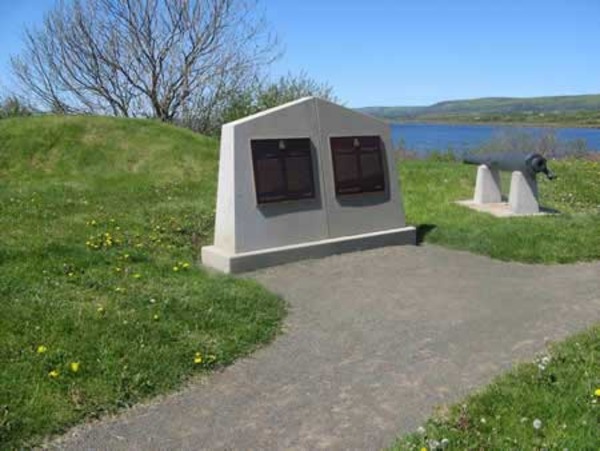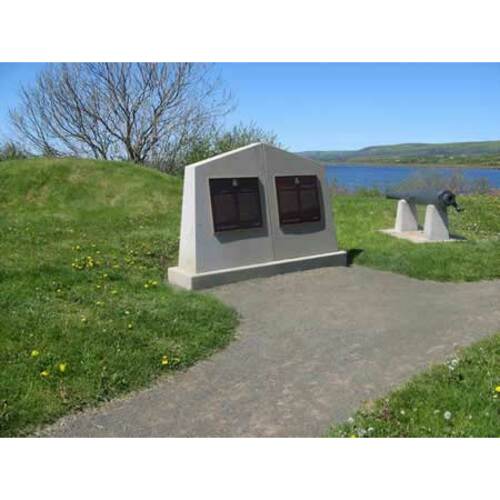
Source: Link
ALEXANDER, Sir WILLIAM, the younger, eldest son of Sir William Alexander, Earl of Stirling, founder of a Scottish colony at Port-Royal (Annapolis Royal, N.S.); b. c. 1602; d. 18 May 1638.
The younger Alexander was educated at Glasgow University, where Regent Blair remembered him as “my best beloved scholar.” After his graduation in 1623 he entered the public service and was knighted 22 March 1627. Two months later he went on a privateering expedition with the larger of two ships which his father was preparing for New Scotland. In June he returned to Dumbarton with a prize, the St. Lawrence of Lubec, loaded with salt. The two ships lay at Dumbarton from June 1627 to 26 March 1628, while Alexander recruited colonists and secured supplies, after which they set out for Newfoundland, the River of Canada (St. Lawrence), and New Scotland. Alexander’s route thereafter is uncertain and can be deduced only indirectly from his father’s correspondence, in which it appears that he left a colony of “70 men and twa weemen” near Canada. It is probable that he joined forces with the Kirkes after they had captured the supply ships of the Compagnie de la Nouvelle-France in the summer of 1628, some of which supplies they left with Alexander’s colonists at Gaspé or Tadoussac (Insh, Scottish colonial schemes, 225). (The assumption is that Alexander picked up these colonists before going to Port de la Baleine.)
On 4 Feb. 1628/29 Alexander, the Kirkes, and others obtained a monopoly of the trade to Canada. While the Kirkes went off to capture Quebec, Alexander joined forces with Sir James Stewart, Lord Ochiltree, helped him build a fort at Port de la Baleine (now Baleine) in Cape Breton, and then, under the guidance of Claude de Saint-Étienne de La Tour, proceeded to Port-Royal. Here, in the summer of 1629, Alexander built a new fort in which he decided to pass the winter, sending back his ship for additional supplies and colonists. He also dispatched Claude de La Tour with an agreement for his father, Sir William, to sign, the terms of which conferred the title of knight-baronet and a large grant of land on Claude and his son Charles de Saint-Étienne de La Tour, in return for their assistance and allegiance. This agreement, slightly modified, was duly signed by Alexander’s father 30 April 1630.
However, when Sir William returned to London that autumn, leaving Sir George Home in charge at Port-Royal, he reported that half the colonists had died during the previous winter. Claude de La Tour, moreover, having been unable to win over his son to the British cause, had lost the support of the Scots at Port-Royal, and had been induced by his son to return to his former French allegiance. Finding that Charles I was about to surrender the colony, Sir William did not return to Port-Royal. After the Treaty of Saint-Germain-en-Laye in 1632, the Scottish colony came to an end and the colonists were transported to England in the Saint-Jean, one of the ships which had brought Isaac de Razilly and French colonists to repossess Port-Royal.
Alexander continued for the rest of his life to be the loyal support of his father. In 1635 he was admitted as one of the extraordinary lords of the session, following his father’s resignation, and in the same year he was appointed a member of the council of the New England company. In 1637 he was made deputy secretary of state for Scotland, with a salary of £300 per annum. Unlike his father, however, he was solvent at the time of his death, which occurred suddenly in London, 18 May 1638. He left only one son, a child of six, who, two years later, enjoyed for a few brief months the title and estates of his grandfather, the Earl of Stirling.
In addition to the references under Sir William Alexander, Earl of Stirling, see Couillard Després, Saint-Étienne de La Tour.
Cite This Article
D. C. Harvey, “ALEXANDER, Sir WILLIAM,” in Dictionary of Canadian Biography, vol. 1, University of Toronto/Université Laval, 2003–, accessed January 2, 2026, https://www.biographi.ca/en/bio/alexander_william_1602_1638_1E.html.
The citation above shows the format for footnotes and endnotes according to the Chicago manual of style (16th edition). Information to be used in other citation formats:
| Permalink: | https://www.biographi.ca/en/bio/alexander_william_1602_1638_1E.html |
| Author of Article: | D. C. Harvey |
| Title of Article: | ALEXANDER, Sir WILLIAM |
| Publication Name: | Dictionary of Canadian Biography, vol. 1 |
| Publisher: | University of Toronto/Université Laval |
| Year of publication: | 1966 |
| Year of revision: | 1979 |
| Access Date: | January 2, 2026 |



